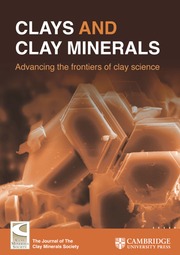Article contents
The “Layer Charge” of Regular Interstratified 2:1 Clay Minerals
Published online by Cambridge University Press: 01 July 2024
Abstract
Alkylammonium ion exchange on mixed-layer minerals gives detailed information about the variation of cation density in succeeding interlayer spaces. Three mixed layer samples from Japan (supplied by Dr. H. Kodama) were investigated. Their nearly 1:1 interstratification is based on regularly alternating high- and low-charged interlayer spaces, which are caused by a regular sequence of polar layers. The cation density in the high-charged interlayer spaces is >0.8 eq/(Si, Al)4O10. The low-charged interlayer spaces have an average cation density of 0.4 eq/(Si, Al)4O10 and heterogeneous charge distribution. The kind of heterogeneity of the Goto Mine sample differs from that of the Yonago Mine and the Honami Mine samples.
The Goto Mine specimen has a rather regular sequence of the low- and high-charged interlayers in proportions close to 0.50:0.50. The other two samples contain interlayer spaces with pronounced unsymmetrical charge distribution. The Yonago Mine sample probably has in random distribution with the polar layers about 10% mica-like layers segregated to packets of three and more layers; the ratio of high-charged interlayers to the low-charged ones is increased to about 0.55:0.45. The Honami Mine sample probably contains isolated mica-like layers or pairs of them. The proportion of the high-charged interlayers is estimated to be about 0.53:0.47 and is lower than determined by Kodama from the glycerolated sample.
The samples investigated may be considered as end-members of a series of interstratified specimens which begins with smectites with mixed-layer like charge distribution.
Резюме
Ионный обмен смешаннослойных минералов и алкиламмония позволяет получить детальную информацию о изменениях плотности катионов в последую-щих межслойных промежутках. Были исследованы три смешанно-слойных образца из Японии (предоставленных Др.Кодома). Их переслаивание, близкое 1:1 основано на регулярном чередовании сильно- и слабо-заряженных межслойных про-межутков, что обусловлено регулярной последовательностью полярных слоев. Плотность катионов в сильно заряженных межслойных промежутках >0, 8эк/(Si, Аl)4О10. Слабо заряженные промежутки имеют среднюю плотность катионов 0, 4эк (Si, Аl)4O10 и гетерогенное распределение зарядов. Вид гетерогенности образцов Гото Майн отличается от видов гетерогенности образцов Янаго Майн и Гонами Майн. Образец Гото Майн имеет довольно регулярную последователь-ность слабо- и сильно-заряженных межслойных промежутков в пропорции, близ-кой к 0, 50:0, 50. Другие два образца содержат межслойные промежутки с явно несимметричным распределением зарядов. Образец Янаго Майн имеет около 10 процентов слюдо-подобных слоев, беспорядочно перемежающихся с полярными слоями и обособленных в пакеты из трех и более слоев; отношение сильно за-ряженных межслойных промежутков и слабо заряженных возрастает до примерно 0, 55:0, 45. Образец Гонами Майн возможно содержит изолированные слюдо-по-добные слои или их пары. Пропорция сильно заряженных межслойных промежут-ков определяется примерно как 0, 53:0, 47 и ниже, чем было определено Кодома в обработанном глицерином образце.
Изученные образцы могут рассматриваться как конечные члены серии пере-слаивающихся образцов, которая начинается смектитами с подобным смешанно-слойному распределению зарядов.
Resume
Der Alkylammoniumionenaustausch an 2:1 Schichtsilikaten mit Wechsellagerungsstruktur ermöglicht Aussagen über die Variationen der Kationendichte in aufeinanderfolgenden Zwischenschichträumen. Drei Proben aus Japan (zur Verfügung gestellt von Dr. H. Kodama) wurden untersucht. Ihre fast 1:1 Wechsellagerung beruht auf regelmäßig abwechselnden hoch und niedrig geladenen Zwischenschichträumen, welche durch eine regelmäßige Anordnung polarer Schichten verursacht wird. Die Kationendichte in den hoch geladenen Zwischenschichträumen ist >0,8 Äquivalente/(Si,Al)4O10. Die niedrig geladenen Zwischenschichträume haben eine mittlere Kationendichte von 0,4 Äquivalenten/(Si,Al)4O10 und die Ladungsverteilung ist heterogen. Die Proben von Goto Mine, Yonaga Mine und Honami Mine besitzen alle eine verschiedene Heterogenität. Die Goto Mine Probe hat eine recht regelmäßige Anordnung der hoch und niedrig geladenen Zwischenschichten im Verhältnis 0,50:0,50. Die anderen zwei Proben enthalten Zwischenschichträume mit ausgesprochen unsymmetrischer Ladungsverteilung. Wahrscheinlich enthält die Probe von Yonaga Mine zusätzlich Pakete aus mehreren Glimmerschichten. Das Verhältnis der hoch geladenen Schichten zu den niedrig geladenen nimmt bis etwa 0,55:0,45 zu. Die Honami-Probe enthält wahrscheinlich isolierte Glimmerschichten oder Paare davon. Der Anteil der hoch geladenen Zwischenschichten wird auf 0,53:0,47 geschätzt und ist niedriger als Kodamas Werte aus der Glycerinaufweitung. Die untersuchten Proben können als Entglieder einer Entwicklungsreihe von Wechsellagerungsverbindungen angesehen werden, an deren Anfang die Smektite mit wechsellagerungsartiger Ladungsverteilung stehen.
Resume
L’échange d'ions alkylammonium sur des argiles interstratifiées donne une information détailée concernant la variation de densité de cations dans la succession d'espaces interfeuillets. Trois exemples du Japon (procurés par Dr.H.Kodama) ont été étudiés. Leur rapport d'interstratification, quasi 1:1, se base sur des espaces interfeuillets alternants régulièrement entre des charges hautes et basses, qui sont causés par une suite régulière de feuillets polaires. La densité de cations dans les espaces interfeuillets à haute charge est > 0,8 eq/(Si,Al)4O10. Les espaces interfeuillets à basses charges ont une densité de cation moyenne de 0,4 eq/(Si,Al)4O10 et une distribution de charge hétérogène. Le genre d'hétérogénéité des échantillons des mines de Goto est différant de celui des échantillons des mines de Yonago et de Honami.
L’échantillon de la mine de Goto a une séquence assez régulière d'espaces interfeuillets à haute et basse charge dans des proportions proches de 0,50:0,50. Les deux autres échantillons contiennent des espaces interfeuillets dont la distribution de charge est d'une assymétrie prononcée. L’échantillon de la mine de Yonago a probablement, en distribution fortuite avec des feuillets polaires, à peu près 10 pourcent de feuillets semblables au mica, rassemblés en paquets de trois feuillets ou plus; le rapport entre les espaces interfeuillets à haute charge et ceux de basse charge est augmenté à prés de 0,55:0,45. L’échantillon de la mine de Honami contient probablement des feuillets isolés semblables au mica, ou des paires de tels feuillets. La proportion des espaces interfeuillets à haute charge est estimée à prés de 0,53:0,47 et est plus basse que celle déterminée par Kodama de l’échantillon glycérolé.
Les échantillons étudiés peuvent être considérés comme étant les termes extrêmes d'une série d’échantillons interstratifés qui commence avec les smectites à distribution de charge semblable à celle des argiles interstratifiées.
- Type
- Research Article
- Information
- Copyright
- Copyright © 1979, The Clay Minerals Society
References
- 51
- Cited by


